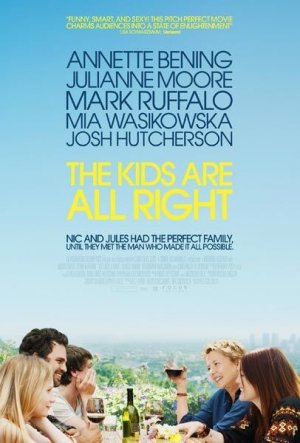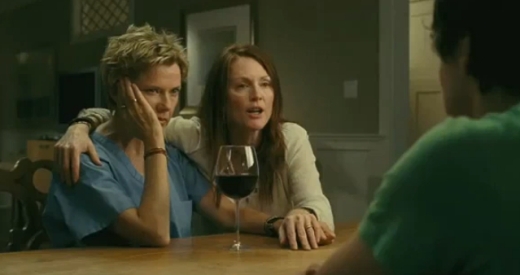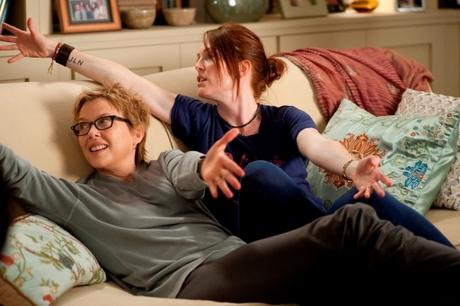Wed 14 Jul 2010
Family Ties
Posted by Ethan under Film Review, NYC Film Critic
Comments Off on Family Ties
The Kids Are All Right
Directed by Lisa Cholodenko
Written by Lisa Cholodenko and Stuart Blumberg
Starring Annette Bening, Julianne Moore, Mark Ruffalo, Mia Wasikowska, Josh Hutcherson
***
I wonder how many of the critics that are rushing to praise Lisa Cholodenko’s admittedly enjoyable comedy The Kids Are All Right as something fresh and different are also regular viewers of the popular ABC sitcom Modern Family.
I ask because the movie and the TV series share a lot in common, starting with their basic premise that unconventional is the new normal, at least when it comes to family life in 21st century America. On Modern Family, for example, two out of the three family units at the center of the show appear far removed from the traditional image of the nuclear family (i.e. a dad, a mom, a handful of kids and a dog). In addition to a gay couple with an adopted Vietnamese daughter, there’s also an older man who lives with his new, much younger Columbian wife and her pubescent son. In The Kids Are All Right meanwhile, Annette Bening and Julianne Moore are the two moms that head up a four-person family, which includes 15-year-old Laser (Josh Hutcherson) and college-bound 18-year-old Joni (Mia Wasikowska). The comic conceit that drives both the show and the movie is that while these clans may not seem “normal†(whatever that means) on the surface, they still share the typical joys, fears, conflicts and love that all families experience.
To drive this point home, Cholodenko and her co-writer Stuart Blumberg frequently put their characters in situations that moviegoers will recognize from their own lives, not to mention other movies and TV series (like, say, Modern Family). Take an early scene in The Kids Are All Right where Mom and Mom are fooling around under the covers and are almost overheard by Joni, who is snooping outside their bedroom door. Later on, Laser stumbles upon his moms’ collection of gay male porn leading to an awkward conversation where Nic (Bening) and Jules (Moore) ask him about his own sexual orientation. It’s also interesting to note that the two women’s roles in the family break down along familiar gender lines. A workaholic doctor, Nic is the breadwinner and stern taskmaster—even her clipped name points to her status as the family’s father figure. Meanwhile, the more nurturing Jules opted out of her career to raise the kids and is only now thinking about re-entering the workforce. By design, they are just like any couple deep into a multi-year marriage; they bicker over behavior (Jules thinks Nic drinks too much at meals, Nic thinks Jules has trouble committing to things) and struggle to carve out quality time together that doesn’t involve the kids.
The unconventional ordinariness of Modern Family and The Kids Are All Right has made both properties into big hits. The former was one of the highest-rated shows of the past TV season and just scored a bundle of Emmy nominations, while the latter debuted to hosannas at the Sundance Film Festival where it secured a fat pickup deal by Focus Features and generated jaw-dropping per-screen box-office numbers in its limited release last weekend. I’m not going to be the curmudgeon that denies either of them their success. Both Modern Family and The Kids Are All Right are graced with a good writing and a terrific ensemble of actors and, at their best, offer an entertaining and perceptive take on contemporary family dynamics.
For me though, the inherent flaw with both of them is the comedy is too often too familiar. Go back to that scene where Nic and Jules confront Laser about his sexual orientation; although the actors handle it well, the writing is straight out of a sitcom. Even less amusing is the character of a Mexican gardener that Moore hires to help her with her fledgling landscaping business. In a movie that’s meant to subvert stereotypes, it’s disappointing that Cholodenko falls back on a stock caricature—the English-challenged laborer who is regularly flummoxed by his boss’s behavior—to score some easy laughs.
It’s also a shame that Bening has to spend much of the movie playing the heavy, a role that she’s forced into in order for the plot Cholodenko has in mind to work. Because if it weren’t for the fact that their mom is a pain in the ass, Laser and Joni probably wouldn’t be so drawn to the new man in their lives—their parents’ previously anonymous sperm donor Paul (Mark Ruffalo), who, as luck would have it, owns a restaurant nearby their L.A. home. Initially they make contact with him out of sheer curiosity, but his laid-back attitude proves to be such a refreshing change from Nic’s micro-managing ways that they start hanging out with him more frequently. Jules is unexpectedly drawn to Paul as well, eventually embarking on an ill-advised affair that can only end badly. Ruffalo is so appealing in the role it’s entirely understandable why the rest of the family is drawn to him rather than the brittle Bening. Just when I was starting to resent Cholodenko for stacking the deck against Nic, she throws in a third-act wrench that re-casts Paul’s behavior into an entirely different light. Without spoiling anything too extensively, it becomes readily apparent that beneath the easygoing aura he attempts to project lies a quiet desperation for a meaningful human connection. And as Paul’s image deflates, Nic re-emerges as the family’s backbone. Had Cholodekno tipped her hand earlier, this shift wouldn’t have been as dramatic. Still, I wish that Bening had been given more notes to play throughout instead of having to wait until the end of the movie to really show off her range.
The last act of The Kids Are All Right actually makes up for a lot of the movie’s earlier flaws, as Cholodenko nudges the material beyond the somewhat generic comedy of the first half into rawer, more compelling emotional territory. Each of the actors gets a moment to shine, but Wasikowska leaves the most lasting impression, beautifully capturing the mixture of eagerness and fear that Joni experiences as she heads off to the freedom of college life, again feelings that many in the audience will likely identify with. In the end, using words like “fresh†and “different†to describe The Kids Are All Right runs counter to what Cholodenko is out to accomplish. This family—and, in a larger sense, this movie—aren’t different from the mainstream…they are the mainstream.
The Kids Are All Right opened in limited release on July 9 and expands to more screens on Friday.





No Responses to “ Family Ties ”
Sorry, comments for this entry are closed at this time.